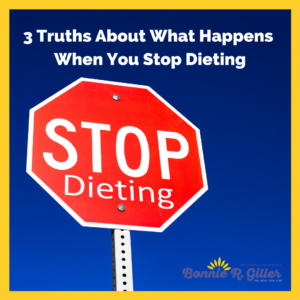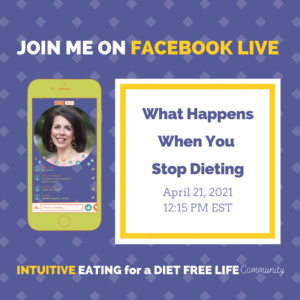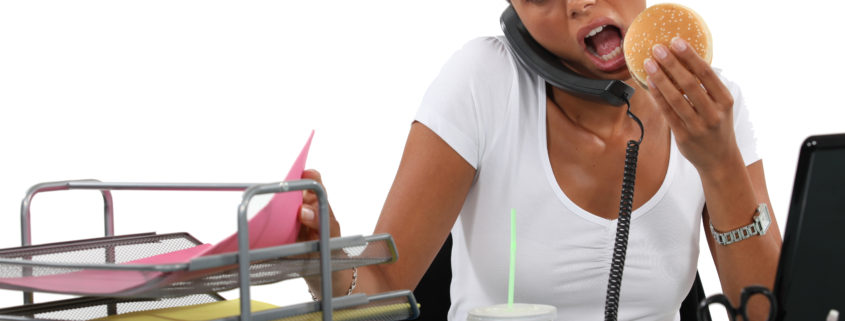3 Truths About What Happens When You Stop Dieting
 Are you thinking about giving up dieting, but you don’t know what to expect when you make this life-changing decision?
Are you thinking about giving up dieting, but you don’t know what to expect when you make this life-changing decision?
Have you already made the decision to stop dieting, but you’re not so confident in this decision?
It makes sense! You’ve been on the diet roller coaster for a LONG time. It feels weird not to be following a set of food rules, even though deep down you know they’ve never worked. But what happens once you give up the food rules?
Let’s look at what your thoughts and fears might be. Then, let’s tackle what you really need to know.
Typical Thoughts When You Give Up Dieting
It’s common to have some uncomfortable thoughts and fears when you think of no longer dieting. Here are some common thoughts:
- “I will gain weight!”
- “I will eat out of control!”
- “I won’t know what to eat.”
- “What do I do without rules?”
- “What if it doesn’t work for me?”
It’s important to be realistic in your expectations when you decide to not diet and to begin your journey towards Intuitive Eating.
What You Need to Know
1. You will want food all the time – and that’s normal!
When you first decide to get off the diet roller coaster and you begin throwing away your food rules, you will want to eat all those foods that were forbidden. And you will want to eat them a lot, and often. This happens because for months, years or even decades you’ve been restricting these foods. So, this reaction is totally “normal”.
Your mind and body are sort of saying “hey, what’s up?” It’s not used to you eating these foods, and it’s thinking “I’m never going to get these foods again! I better stock up while I can because these won’t be around forever!”
This will continue to happen as you continue to test the process of Intuitive Eating. “Can I really eat what I want?”
Yes you can.
2. It is a long process.
Please have realistic expectations. You cannot expect your body to adapt to giving up dieting and shifting to Intuitive Eating overnight. The communication between your mind and body has been suppressed for quite a while. Hunger, fullness, and satisfaction have been ignored—so you must rebuild this communication!
You might be feeling that it’s difficult to stay motivated and invested in the journey, especially if progress isn’t immediate. But that’s your diet mentality speaking. You are programmed to want immediate results but it’s important to build your patience muscle as you work on changing your relationship with food for the rest of your life.
Focus on the long game!
3. No two journeys are the same.
Working at your own pace is totally okay.
As a dieter, you likely have an “all or nothing” mentality—”going all in with something full force, or not doing it at all”. Having this mentality can hold you back.
Instead of diving headfirst, trying to rush the process and being “good”, take one step that you feel confident in and let it be that—just a first step. Once you feel ready, take another step forward and so on.
Take the journey at your own pace, be true to yourself. Don’t compare your journey to anyone else’s journey because you don’t know their story!
There is no race to any finish line! Intuitive Eating is a practice. It’s not something that ends when you get to a goal.
Want to know more about the 3 phases you will go through when you stop dieting?
Join me today for a LIVE training on this topic, right in my Facebook Group.








